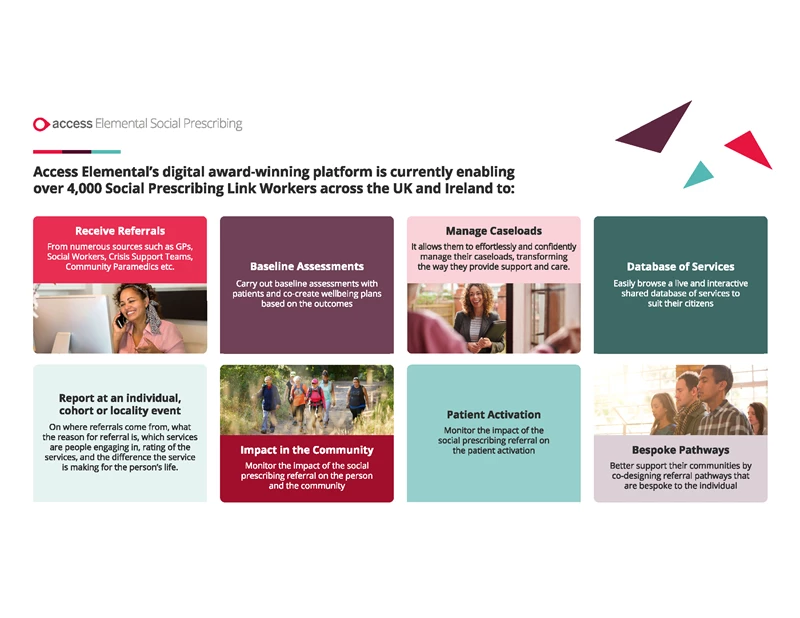
PRSB’S Social Prescribing Information Standard – What is it and why is it important?
Social prescribing is continuing to improve citizen wellbeing to enhance community cohesion and reduce pressure and demand on health and social care services. There are many different social prescribing models which can be used and with that there are many differences in how services and local authorities run their services.
Like a lot of services across Health and Social Care, PRSB standards offer a more standardised approach to collecting, recording, and sharing information to achieve better outcomes.
 10
10

Written by Claire Wardle
At Access Elemental Social Prescribing we are aware of the difficulties helping our customers meet the mandatory minimum data standards. That’s why we are thrilled to announce that we are the only official partner for the PRSB’s Social Prescribing Standards.
We have been involved in the process of developing the standards from the start by offering insight into the challenges some of our customers have experienced. As we also start our journey of becoming the first social prescribing software to be conformant to these standards, we would love to talk to you about your project.
In this article we will provide all there is to know and understand about the PRSB Information Standard for social prescribing, how it works, and the benefits it has for Link Workers, local authorities, clinicians, and the end-users themselves. We will also be highlighting the benefits of our partnership with the PRSB as well as our plans for our partnership in the future.
Jump to section:
- Who are PRSB?
- Why is PRSB important in Health and Social Care?
- PRSB Information Standards – Why are they important for social prescribing?
- What will the PRSB Social Prescribing standard look like?
- How does the PRSB Social Prescribing Standard work?
- PRSB and Access Elemental Social Prescribing – What are the benefits of this partnership?
- Top tips for adopting the PRSB Social Prescribing Standards
- Summarising the PRSB Social Prescribing Standards
Who are PRSB?

The Professional Record Standards Body (PRSB) were established in 2013. They are an independent, no profit community interest company which aim to develop clinical standards for health and social care records.
They work with people who use services, carers, doctors, nurses, social workers, and other care professionals to define the information needed when someone receives care.
Their suite of standards identifies the critical set of information for safe care and best practice. It helps to tell providers what information should be recorded, stored, and shared in a standardised and interoperable way across a variety of different healthcare systems and providers including: core records, transfers of care, social care, medicine and pharmacy and supporting implementation to name a few.
Recently they have been working hard to release more standards concentrating on personalised care, including standards for social prescribing. The details have already been published and will be discussed later on in this article. But what is important to note is that anyone involved in working in social prescribing must be compliant to these standards by the 30th September 2023.
This is very exciting for the social prescribing world as it offers more consistency and continuity across all the social prescribing data and information that gets collected over time. At Access Elemental we have also loved being involved throughout this process by offering our insights in various pilots about what standards are needed and how they can benefit everyone involved.
In the last two years they have also create their Standards Partnership Scheme which 58 suppliers have currently joined, and the number keeps rising. The aim of creating this partnership is to help the PRSB understand the application of the standards and their impacts to identify if any adaptations are needed. Through doing this, the PRSB can identify what the challenges are to see where there are still gaps across Health and Social Care market to improve on.
It is a great two-way partnership which also allows suppliers get expert help and advice on how best to undertake conformance assessments as well as a variety of other benefits.
Why is PRSB important in Health and Social Care?
In general, the PRSB is important in several different ways for the health and social care sector. Some examples include:
- Better interoperability
- Delivers more person-centred care
- Better Efficiency and Safety
- Allows time for more innovation and research
1. Better interoperability
By establishing and promoting standards for health and social care records, the PRSB help to ensure that information can be effectively shared and accessed across different healthcare settings. This interoperability helps to deliver better continuity of care, reduce errors, and allow healthcare providers to have a better co-production approach to help improve outcomes further, and therefore ensure there is better shared-decision making.
2. Delivers more person-centred care
One of the biggest priorities for the PRSB is to develop standards that prioritise the needs and preferences of patients. Through establishing clear guidelines for recording and sharing information, the PRSB help encourage healthcare providers and patients themselves to be more engaged in their own health and wellbeing. Through doing this healthcare providers can deliver care that matters to the individual better.
3. Better Efficiency and Safety
One of the biggest benefits of the PRSB’s work is that it enhances both the efficiency and safety of health and social care delivery. Through providing consistent formats and structures for health and social care records, the PRSB help to minimise errors, avoid data duplications, improve data accuracy, and streamline processes to improve health outcomes further.
4. Allows more time for innovation and research
The work which PRSB do ultimately creates a foundation for the development of innovative health and social care technologies, solutions, and systems. By adopting consistent data standards, researchers and developers can effectively analyse and exchange data and information to improve quality assurance and data insights to generate more data-driven decisions to allow further innovation in health and social care.
Therefore, the PRSB across Health and Social Care is essential in promoting the development and adoption of standards for digital health and social care records. This in turn, allows better care coordination, more co-production and shared decision making, better patient engagement, and more improved efficiency and safety in health and social care systems, without the risk of any data breaches.
Learn more about how Access Elemental Social Prescribing software can support you.
PRSB Information Standards – Why are they important for social prescribing?
Like already discussed the PRSB Standards are crucial across health and social care for a number of different reasons. Now they are releasing new information standards for social prescribing to help overcome some of the gaps social prescribers are currently facing.
This is important as it allows social prescribing services to continue to grow bigger each year whilst still being able to manage social prescribing referrals effectively, without any risk of errors, losing data, and to help them manage their admin better.
One of the main reasons why the social prescribing standards have been introduced is because currently the handling of social prescribing data and information is inconsistent. Different services use the infroamtion in various ways which makes it difficult to understand how this information is being fed back to the referrer and the end-user themselves.
The purpose of the social prescribing standard therefore was to introduce three main things:
- Support to Social Prescribing Link Workers and other Practitioners
- Support the people experiencing social prescribing
- Support the information needed for secondary purposes to inform population health
Some social prescribing services and programmes rely heavily on paper process, manual processes or spreadsheets to record all their individual social prescribing journeys. Not only is this time-consuming, but it also increases the risk of data and information being lost as well as the risk of it being shared incorrectly.
Equally, due to the lack of consistency when presenting the true value of social prescribing, many Link Workers feel their work is undervalued as there is a lack of understanding on how the data collected is needed and how it is interpreted.
Social prescribing standards are important therefore, as it demonstrates the link between social prescribing and population health management and the importance of both understanding and addressing how the wider social determinants of health can impact someone’s health and wellbeing.
The new social prescribing standards are vital as it prevents these risks from happening, as well as offer better ways to record and measure social prescribing to share progress with healthcare professionals and end-users. Through being able to quickly and easily share this progress individuals can feel more involved in their journeys and are more likely to be better engaged.
Consistency in recording social prescribing journeys across the board is very limited, for social prescribing to have a higher and more respected profile, Link Workers need to be integrated into primary services not just to work in the periphery of the NHS, but to demonstrate the value and impact social prescribing can have on an individual and their community. Through efficiently measuring and recording its impacts you can get better engagement from healthcare professionals, and potentially get more funding.
How have Bristol, North Somerset and South Gloucestershire (BNSSG) ICS prepared for the social prescribing standard?
One of our customers, Thomas Manning, the Head of Business Intelligence and ICB Data Protection Officer for NHS Bristol, North Somerset and South Gloucestershire ICB feels that these social prescribing standards will help massively by linking datasets across primary and secondary care, as well as PCNs to gain a better holistic view on the value social prescribing has on individuals and the wider community.
“ There is a lot of variety when it comes to collecting social prescribing data. It ranged from nothing, to in house spreadsheets to social prescribing software. Access Elemental either captured it all or could capture it all where in house spreadsheets couldn’t. I’ve gone back very strongly to commissioners and primary care leads and said you need to get everybody on to Access Elemental Social Prescribing for a number of reasons. But in terms of data capture it will give a consistent form for data capture meaning that you’ll be able to get the data back out again in a consistent form for analysis.”
Thomas Manning, The Head of Business Intelligence and ICB Data Protection Officer for NHS Bristol, North Somerset, and South Gloucestershire ICB.
Without a standard for recording and hosting information as part of the holistic practice of social prescribing, Link Workers will just continue to remain on the boundaries of multi-disciplinary teams. Quality data must be shared to show other healthcare professionals and end-users the real picture of social prescribing.
Currently there isn’t a way to capture all the work that goes on in every step of someone’s journey. Here the PRSB Information Standards for Social Prescribing provide that and recognise that social prescribing is personal to every individual involved and that there will never be one size fits all.
How was the PRSB Social Prescribing Standard established?
Like discussed previously there were several reasons why there was a need to create and establish social prescribing standards.
One of the biggest reasons why these standards needed to be established is because it would help explain to PCNs and ICBs what social prescribing is, the benefits of social prescribing and why it is important for individuals, clinicians, and the community as a whole.
Denys Rayner, Implementation Project Manager for the Social Prescribing Standard stated that:
“There’s a real problem about consistent interpretation of data and what social prescribing actually is and what it means. With all the various different roles in existence, there’s a lot of confusion between what a social prescriber, a care coordinator and a health coach is. The linking of social prescribing and population health management is a fundamental shift from reactive to proactive care. The problem is not everyone understand the value of linking these two approaches together.”
Through being able to consistently record the same data comparisons can be made locally, regionally, and nationally to demonstrate why social prescribing is important.
To do this the NHS brought together a variety of stakeholders to discuss what was needed and how logistically this could happen. This included GPs, clinicians, Link Workers, as well as software developers so all stakeholders’ perspectives could be considered to move forward.
These standards were then co-produce with all the stakeholders onboard until an efficient set of standards were agreed.
Prior to the introduction of the standards the use of SNOMED codes were very limited. What was made clear is as social prescribing has gained in popularity many areas use different terms for the same things. For example, whether an area had a Link Worker, a Care Navigator or a Community Navigator the same principles of social prescribing were used. However, the SNOMED codes did not reflect that. This made the recording of social prescribing data and records confusing and inconsistent.
To overcome this challenge, more SNOMED codes needed to become available. They needed to be less medicalised so that every party involved in a social prescribing journey knew what they were and what they meant so they could be more widely adopted.
This will help to encourage more widespread adoption of the standards sooner as it can help educate ICBS what social prescribing is and why it is important, to proactively encourage the shift from reactive to preventive care.
What will the PRSB Social Prescribing standard look like?
To create the PRSB Social Prescribing standard the PRSB were commissioned by both NHS England and NHS improvement to develop a data standard to record and share information about social prescribing consistently and effectively.
The social prescribing standard has now received ISN status after rigorous quality assurance checks by the NHS Data Alliance Partnership Board.
Here this standard will be appropriate for all social prescribing bodies regardless of the social prescribing model they use, including those in local authorities, and voluntary organisations, as well as in health and social care.
The standard will enable the sharing and recording of information for the whole of the social prescribing journey.
“I think in an ideal scenario, in the next 12 months it would be fantastic to see a widespread adoption of the social prescribing standard. I think our main challenge will be making sure everybody is aware of it and the benefits it offers, we need to re-educate everybody for it to be the success it can be.”
Denys Rayner, Implementation Project Manager for The Social Prescribing Standard
This standard will be UK wide involving all 4 nations and will have an important role to play in the national drive to widen the use of social prescribing to empower individuals and support more personalised care which is stated in the NHS Long Term Plan.
For the standard to support the recording and sharing of information it will include:
- The information required to support the conversations between social prescribing link workers and the individual.
- Information to support people so their healthcare is joined up to avoid them retelling their story over and over.
- Summary information back to the referrer and GP for the individual’s overall record.
- Information that can be shared back with the individual themselves, their family, or carer.
- Information for secondary uses e.g. for understanding the scale and effectiveness of social prescribing services, planning, and population health management.
How does the PRSB Social Prescribing Standard work?
For the standard to work it will be split into three scenarios:
- Social Prescribing Information Standard
- Referral to social prescribing services
- Message back to GP and referrer
Within each of these parts there are standards that are either: mandatory, required, or optional. The social prescribing standard is then split into a further two parts:
- Information Standard
- Minimum Dataset
1. Information Standard
The Social Prescribing Information Standard enables the sharing and recording of information for the whole patient journey from initial referral, throughout the period of social prescribing, and the message back to the referrer and GP at its conclusion.
The standard is important to several different stakeholders such as:
- Commissioners – e.g. it helps to ensure they are aware of the data requirements to help them procure and implement software systems that can comply
- Software Suppliers- e.g. All those who are seeking to sell approved social prescribing software will need to ensure their systems comply by the 30th September 2023
- Data Managers – e.g. To be able to ensure that they can collect the information needed and present it appropriately
- Link Workers – e.g. it will help them collect information which is high level and be able to be more proactive in the management of an individual’s journey
- ICB – e.g. the information collected can aid the understanding and impact of population health project roll outs
- Government – e.g. The government will finally be able to see nationally what impacts social prescribing can have across the country
2. Minimum Dataset
The Minimum Dataset is a sub section of the Information Standard and consisting of 4 sections of terminology supported by SNOMED Codes to make it easier to pass through information into clinical systems. These sections are:
- Demographic Information
- Needs and Concerns
- Support
- Measures
In total there are now 76 agreed terms, excluding SNOMED Codes that help define different outcomes to provide descriptions to explain different parts of a journey. Here various core GP IT systems and those social prescribing specific systems that are on the HSSF framework will be all capable of recording the terms and coding them.
Here the Minimum Dataset therefore offers a series of ‘headings’ that are advisable to collect and form the basis of a nationally recognised collection of consistent data to support the wider understanding of social prescribing and the benefits of it. This also allows Link Workers to manage social prescribing referrals better as all parties involved will know, understand, and use the same codes to track the different journeys within the community, as well as nationally, so we can all get a wider picture of the value of social prescribing.
Below is a table of some examples of some of the new SNOMED codes that have been agreed and published across the 4 different sections.
|
SNOMED Code Section |
Example |
|
Demographic Information |
Caring Status – has a young carer - 1597921000000107 |
|
Needs and Concerns |
Digital exclusion – Unable to perform information and communication technology activities - 1597941000000100 |
|
Support |
Signposting to a volunteering activity (Procedure) 1577271000000106 |
|
Measures |
14-item scale WENWBS Score - 718426000 |
PRSB and Access Elemental Social Prescribing – What are the benefits of this partnership?
At Access Elemental Social Prescribing we have been aware of how important it is for the data and information that is collected and stored to be standardised. This is because it can improve interoperability between systems and allow Link Workers to have a more prominent role in multi-disciplinary teams and help present a better picture of the impact of social prescribing.
We wanted to get involved in helping create standards in whatever way we could right at the start of the process when the Health Systems Support Framework (HSSF) released their provision of digital social prescribing solutions.
Through working with the PRSB in their initial pilot stages of creating standards up until now we have thoroughly enjoyed seeing how they work and seeing how our thoughts on the importance of social prescribing align and decided to join the PRSB Standards Partnership.
We are now the only official social prescribing partner of the PRSB, and with that we have access to many benefits including regular updates on national policy briefings, access to bi-annual roadmap events, as support from experts to help us become the first social prescribing software to be 100% conformant to the standards.
As a social prescribing software company, we do feel like we have a lot of areas which are already compliant, but having experts help from the PRSB helps us to perform even better in our assessment.
As our partnership builds, we cannot wait to get involved in more exciting events with them as well be part of joint campaigns to help promote the importance of these standards. For more information and see regular updates of our partnership with the PRSB follow our Access Elemental Social Prescribing LinkedIn so you never miss anything.

Top tips for adopting the PRSB Social Prescribing Standards
In our recent webinar summarising everything there is to know about the PRSB Social Prescribing Standards the PRSB highlighted that any good digital transformation journey with social prescribing data must include:
- A vision – Everyone must know why you’re developing or implementing a digital system, identify the benefits and the barriers
- A well discussed and developed plan – teams must be engaged early on the benefits of the standards and how the change will take place
- A collaborative design process – teams should be involved at every step of the design process to ensure the solution works for them and that they can access the information they need when they need it
The PRSB have also released 7 key top tips in ensuring that you are prepared for the social prescribing standards.
- Don’t panic
- Have better data quality
- Have a think about how you can put the data to best use
- Involve different stakeholders – strengthen relationships between primary care, VCFSE, housing, local councils, secondary care and social care
- Set up a data task
- Make sure you use platforms that can support you easily
- Take it a step at a time
Summarising the PRSB Social Prescribing Standards
In this blog I have reviewed who the PRSB are and why they are important in health and social care. This article has also highlighted why the PRSB introducing social prescribing standards is important and how it will benefit a wide variety of stakeholders and healthcare professionals involved in social prescribing, as well as the end-user themselves.
Through explaining how the social prescribing standards will work this article has been able to explain how the standards were established and how at Access Elemental Social Prescribing we were able to provide insight into what Link Workers and other stakeholders struggle with when running a social prescribing service, so systems can now be more consistent and streamlined to help provide a better picture of the value and impact of social prescribing.
This article has also highlighted how we plan to continue working with PRSB as we are their first official social prescribing partner, as well as how we plan to continue working with them in the future to help ensure all social prescribing users can have the best journey possible.
For more information on how best to implement social prescribing right in your area to ensure you deliver the best social prescribing journeys catered to each individual, download our social prescribing guide today.
Learn more about our social prescribing software and how we can help you adapt your processes better to be compliant with the upcoming social prescribing standards contact us today.
Let’s work together to help prove social prescribing works and show the government the true value of social prescribing.






